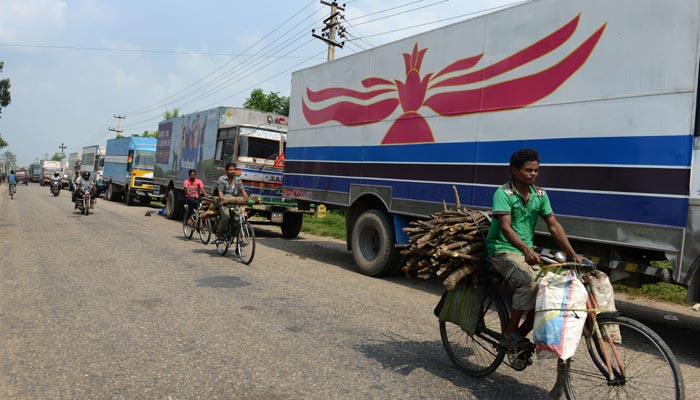Nepalese cyclists ride past trucks parked near the Nepal-India border at Birgunj on Sunday.
AFP/Kathmandu
Nepal on Sunday imposed nationwide restrictions on vehicle use due to growing fears of a fuel shortage, as protesters seeking changes to a new constitution vowed to keep blocking a major border trade route.
Drivers are allowed on the roads only on alternate days, depending on whether their licence plates end in odd or even numbers, to try to counter the effect of the blockade imposed on the India-Nepal border since Thursday night.
"The government has decided to limit the number of vehicles moving across the country due to the fuel shortage," home ministry spokesman Laxmi Prasad Dhakal told AFP.
"We are facing a huge problem because of the blockade in the south and are trying to use the fuel we have effectively."
Hundreds of protesters called for amendments to the constitution as they blocked a bridge crossing in the town of Birgunj, 90 kilometres south of Kathmandu, that serves as the key hub for oil and food imports into landlocked Nepal.
The protesters, from the Madhesi community, are angry about plans to divide the Himalayan nation into seven federal provinces under the charter adopted on September 20.
More than 40 people have died in weeks of clashes between police and protesters from the Madhesi and Tharu communities, ethnic minorities who say the new internal borders leave them under-represented in the national parliament.
"I joined this protest to fight for my rights... and for the rights of my children and grandchildren," Ajay Patel, a 40-year-old farmer, told AFP.
"Why does the state not treat us like citizens of this country?"
Madhesi leaders vowed to continue the blockade until lawmakers agreed to their demands.
"The state has refused to listen to our voices...this is a battle for equality," said Shiva Patel, general secretary of the regional Sadbhawana party, which walked out of parliament last month amid deepening discord over the charter.
Trucks stuck in India
Customs officials in Birgunj said the blockade has halted all traffic for days.
"There is a 20-kilometre-long line of trucks waiting on the Indian side," said Mitra Lal Regmi, Birgunj customs chief.
"Even during strikes, we would escort some 300 trucks safely across, but this time we have seen no activity for days," he said.
Officials said cargo movement through other border checkpoints has also declined since last week, and fears of a fuel shortage have prompted commuters to form long lines at petrol stations in Kathmandu.
The government has asked international airlines to carry their own supplies on board if they need to refuel in the capital because of concerns of an impending shortage on the ground, Kathmandu airport spokesman Purna Prasad Chudal told AFP, without elaborating.
The new constitution is the final stage in a peace process that began when Maoist rebels laid down their arms in 2006 after a decade-long insurgency. They won parliamentary elections two years later and abolished the monarchy.
But the adoption of the charter, Nepal's first to be drawn up by elected representatives, has been marred by weeks of violent protests in the southern plains, home to half the country's population.
Former Maoist prime minister Baburam Bhattarai on Saturday resigned from his party and parliament in support of the protesters.
The violence has also sparked concern in India, which has traditionally exerted significant political influence in Nepal.

